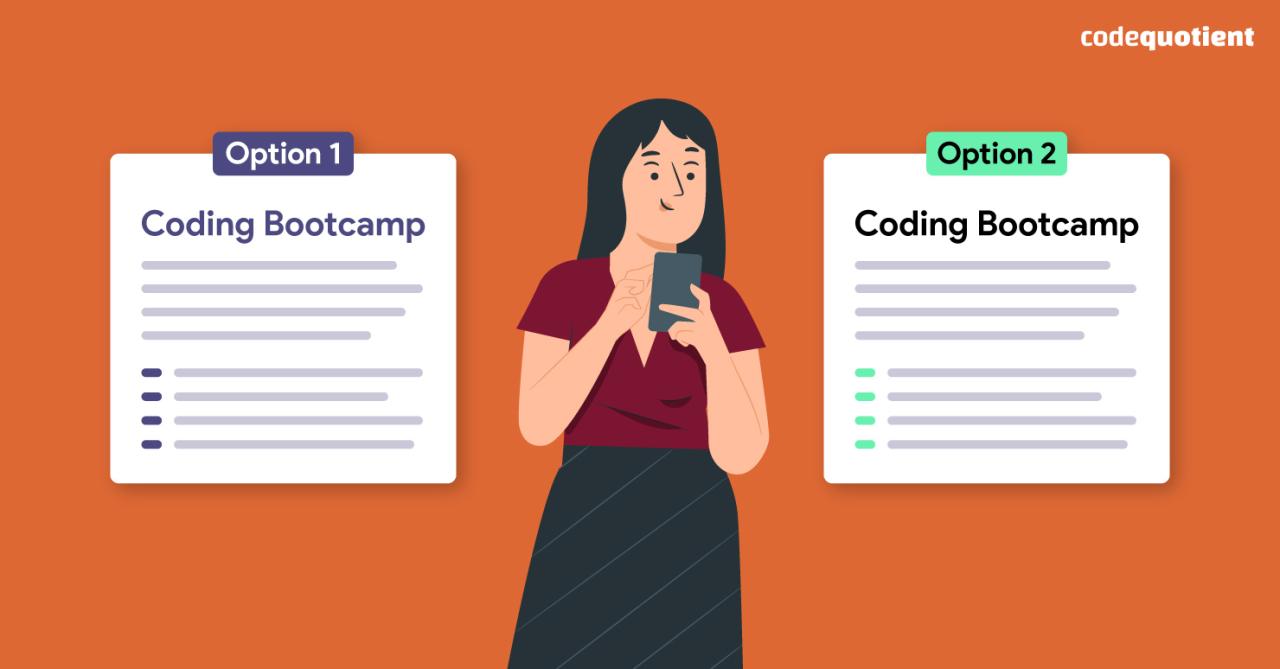Career Goals and Bootcamp Alignment

Coding bootcamps offer an intensive, focused approach to learning in-demand tech skills, directly impacting career trajectories. They are designed to bridge the gap between theoretical knowledge and practical application, equipping graduates with the portfolio and skills needed to secure entry-level positions. This contrasts with self-teaching, which often lacks the structure, mentorship, and networking opportunities provided by a bootcamp environment.
Bootcamps can significantly accelerate the process of achieving specific career aspirations within the tech industry. Whether your goal is to become a front-end developer, a data analyst, or a cybersecurity specialist, a well-structured bootcamp curriculum can provide the necessary foundation and practical experience to launch your career.
Job Market Demand for Bootcamp vs. Self-Taught Skills
While self-teaching can demonstrate initiative and passion, employers often prioritize candidates with demonstrable skills and structured training. Bootcamps provide a verifiable credential, showcasing a structured learning path and often including projects that directly address industry needs. The structured nature of bootcamp projects and the inclusion of career services often gives bootcamp graduates a competitive edge in the job market. For instance, a candidate with a bootcamp certification in full-stack development, showcasing multiple completed projects, is more likely to attract recruiters than a candidate with only self-taught skills and a less defined portfolio. The structured learning environment also helps develop soft skills crucial for teamwork and communication, further enhancing employability.
Potential Salary Range for Bootcamp Graduates
Salary expectations for bootcamp graduates vary considerably based on the specific programming field, location, and individual experience. However, several sources suggest that graduates often command competitive starting salaries. For example, a junior front-end developer might expect a salary between $60,000 and $80,000 annually in major US tech hubs, while a data analyst might earn between $55,000 and $75,000. Backend developers can expect a similar range, and those specializing in areas like machine learning or artificial intelligence often command significantly higher salaries. These figures are estimates and can fluctuate based on market conditions and individual performance.
Bootcamp Outcomes vs. Job Role Requirements
The following table compares the learning outcomes of a typical full-stack web development bootcamp with the requirements of three common tech roles: Front-End Developer, Back-End Developer, and Full-Stack Developer.
| Skill/Requirement | Front-End Developer | Back-End Developer | Full-Stack Developer |
|---|---|---|---|
| HTML, CSS, JavaScript | Essential | Beneficial | Essential |
| React, Angular, or Vue.js | Essential | Less Essential | Essential |
| Databases (SQL, NoSQL) | Beneficial | Essential | Essential |
| Server-side languages (Node.js, Python, Java) | Less Essential | Essential | Essential |
| API Integration | Essential | Essential | Essential |
| Version Control (Git) | Essential | Essential | Essential |
| Testing and Debugging | Essential | Essential | Essential |
Learning Style and Bootcamp Structure
Choosing the right coding bootcamp hinges significantly on understanding your learning style and how it aligns with the bootcamp’s structure. Different formats cater to diverse learning preferences, impacting the overall learning experience and success rate. This section explores the various bootcamp formats and their suitability for different learning styles.
The immersive, part-time, and online formats each present a unique learning environment. Understanding these differences is crucial for selecting the best fit. The intensity of the program, the flexibility offered, and the level of self-discipline required vary considerably across these formats. Successful navigation of each format often depends on a learner’s existing skills and preferred learning methods.
Immersive Bootcamp Formats
Immersive bootcamps are intensive, full-time programs typically lasting 12-16 weeks. They demand a significant time commitment, often requiring students to dedicate most of their waking hours to learning. This format is best suited for highly motivated individuals who thrive in fast-paced, collaborative environments and prefer hands-on, project-based learning. Students learn through intensive lectures, workshops, and group projects, often culminating in a capstone project that showcases their acquired skills. For example, an immersive bootcamp might involve building a full-stack web application from scratch, requiring collaboration and problem-solving within a team. This intense environment fosters rapid skill acquisition, but it demands significant self-discipline and the ability to manage stress effectively.
Part-Time Bootcamp Formats
Part-time bootcamps offer a more flexible learning schedule, typically meeting one or two evenings a week or on weekends. This format is ideal for individuals who are balancing work, family, or other commitments. While it extends the learning period, it allows for a more gradual learning curve, suitable for learners who prefer a less intense pace. Part-time bootcamps often utilize a blended learning approach, combining online modules with in-person classes. A hands-on project in a part-time program might involve developing a mobile app over several weeks, with incremental progress made during class sessions and independent study. This structure allows for a more manageable workload but requires greater self-motivation and time management skills.
Online Bootcamp Formats
Online bootcamps provide the greatest flexibility, allowing students to learn at their own pace and from anywhere with an internet connection. This format suits self-directed learners who are comfortable with independent study and possess excellent time management skills. While online bootcamps often lack the in-person interaction of immersive or part-time programs, they frequently incorporate interactive elements like virtual classrooms, online forums, and peer-to-peer learning opportunities. An example of a practical project in an online bootcamp could be creating a data visualization dashboard using a specific library, with assignments and feedback provided through the learning platform. Successful completion of an online bootcamp demands exceptional self-discipline and the ability to stay motivated without the direct supervision of instructors.
Comparison of Teaching Methodologies, Is a coding bootcamp right for me
The effectiveness of a bootcamp’s teaching methodology is directly related to a student’s learning style. Understanding the different approaches is key to selecting a suitable program.
- Project-Based Learning: This approach centers around building real-world applications. Students learn by doing, tackling complex projects that require them to apply their knowledge. This is highly effective for kinesthetic learners who prefer hands-on experiences. Examples include building websites, developing mobile apps, or creating data analysis tools.
- Lecture-Based Learning: This method involves traditional classroom lectures, often supplemented with readings and assignments. It’s better suited for auditory learners who benefit from structured instruction and clear explanations. While less hands-on, it provides a strong theoretical foundation.
- Hybrid Approach: Many bootcamps blend project-based and lecture-based learning, offering a balanced approach that caters to diverse learning styles. This combines the theoretical understanding from lectures with the practical application through projects, creating a comprehensive learning experience.
Financial Considerations and Return on Investment

Choosing a coding bootcamp is a significant financial decision. It’s crucial to thoroughly assess the costs involved and project the potential return on your investment to ensure it aligns with your financial situation and career aspirations. Understanding the financial landscape will empower you to make an informed choice.
The total cost of a coding bootcamp encompasses tuition fees, additional program fees, and living expenses. These costs vary significantly depending on the bootcamp’s location, duration, and the intensity of the program. A thorough financial plan is essential to avoid unexpected debt burdens.
Bootcamp Costs Breakdown
Tuition fees are the most significant expense. Bootcamps typically charge between $10,000 and $20,000, though some intensive programs or those located in high-cost-of-living areas can exceed this range. Additional fees might include application fees, materials costs (textbooks, software licenses), and career services fees. Living expenses, including rent, utilities, food, and transportation, must also be factored in. For instance, a three-month bootcamp in a major city could easily require an additional $10,000 – $15,000 for living expenses. Therefore, a realistic budget should include all these elements.
Return on Investment (ROI) Calculation
Calculating ROI involves comparing the increased earning potential after completing the bootcamp with the total cost of the program. Let’s consider an example: Suppose a bootcamp costs $15,000 (including tuition and living expenses). After graduation, the individual secures a job with a $70,000 annual salary, compared to a previous salary of $40,000. The annual increase is $30,000. A simplified ROI calculation would be: ($30,000 annual increase) / ($15,000 bootcamp cost) = 2. This indicates a 200% ROI annually, but this calculation does not account for loan repayment if applicable. A more sophisticated model would incorporate the loan repayment schedule and interest rate to determine the net ROI over a defined period.
Funding Options
Several options exist to finance bootcamp tuition. These include:
- Personal Savings: Using your own savings is the most straightforward approach, eliminating the need for debt.
- Loans: Many financial institutions offer student loans specifically for coding bootcamps. It’s essential to compare interest rates and repayment terms from different lenders before committing to a loan.
- Scholarships and Grants: Some bootcamps and organizations offer scholarships or grants to cover tuition costs or a portion thereof. Researching these opportunities is worthwhile.
- Income Share Agreements (ISAs): Some bootcamps offer ISAs, where you pay a percentage of your income after securing a job, for a defined period. This option shifts the financial risk to the bootcamp, but it’s crucial to understand the terms and conditions.
Risks and Benefits of Debt
Taking on debt for a coding bootcamp carries both risks and benefits.
- Benefits: Debt can provide access to a potentially lucrative career path that might otherwise be inaccessible. The increased earning potential can quickly offset the debt burden.
- Risks: Failing to secure a well-paying job after graduation can lead to significant financial strain. Careful consideration of the program’s job placement rate and potential career paths is crucial to mitigate this risk. High interest rates on loans can significantly increase the overall cost of the bootcamp.
Bootcamp Selection and Program Evaluation: Is A Coding Bootcamp Right For Me
Choosing the right coding bootcamp is a crucial step in your career transition. A thorough evaluation process, considering various factors beyond just the curriculum, will significantly increase your chances of success. This section will guide you through a structured approach to comparing bootcamps and making an informed decision.
Curriculum Comparison
Different bootcamps offer varying curricula, focusing on different specializations and technologies. For example, Flatiron School emphasizes a full-stack curriculum covering both front-end and back-end development, often using Ruby on Rails. App Academy focuses on a more intensive full-stack curriculum, known for its rigorous learning environment and strong job placement assistance. General Assembly offers a wider range of courses, including data science, UX design, and digital marketing, alongside various coding specializations. These differences reflect the varying career paths students might pursue. A comparison of these curricula reveals different strengths and focuses, highlighting the importance of aligning your career goals with a bootcamp’s specific offerings.
Bootcamp Reputation and Credibility
Evaluating a bootcamp’s reputation involves examining several key aspects. Accreditation, while not universally required, provides a level of assurance regarding the quality of education. The bootcamp’s instructors should have substantial industry experience, ideally demonstrated through their portfolios and professional networks. A strong online presence with positive reviews and testimonials from past students can also indicate a positive learning experience. Transparency regarding job placement rates and alumni success stories is vital. Be wary of bootcamps that lack detailed information on these aspects or make exaggerated claims. Checking independent reviews on sites like Course Report and SwitchUp can provide a balanced perspective.
Researching Alumni Experiences and Job Placement
Investigating alumni experiences and job placement rates is essential. Many bootcamps publish their job placement statistics on their websites. However, it’s crucial to scrutinize these figures, looking for details on the types of jobs secured, average salaries, and the timeframe within which graduates found employment. Actively seeking out and contacting alumni through platforms like LinkedIn is highly recommended. Directly asking about their experiences, challenges, and the support they received from the bootcamp can offer invaluable insights not always found in official reports. Look for consistent feedback across multiple sources to gauge the overall experience.
Bootcamp Evaluation Framework
A structured approach to evaluating bootcamps is crucial for a successful outcome. The following table provides a framework for comparing different options based on individual needs and preferences:
| Factor | Rating (1-5) | Notes | Bootcamp A |
|---|---|---|---|
| Curriculum Alignment | How well does the curriculum match your career goals? | ||
| Instructor Experience | Assess the instructors’ industry experience and teaching skills. | ||
| Job Placement Rate | Consider the reported job placement rate and its context. | ||
| Learning Environment | Evaluate the learning style and overall environment (online/in-person). | ||
| Cost and Financing | Assess the total cost and available financing options. | ||
| Alumni Network | Consider the size and activity of the alumni network. | ||
| Career Services | Evaluate the quality and comprehensiveness of career services. | ||
| Flexibility and Support | Consider the flexibility of the program and the level of support offered. |
Alternative Learning Paths and Self-Assessment

Choosing between a coding bootcamp and self-learning is a significant decision. Both paths offer opportunities to acquire coding skills, but they differ significantly in structure, support, and cost. Understanding the advantages and disadvantages of each approach, along with a realistic self-assessment, is crucial for making an informed choice. This section will explore these aspects to help you determine the best path for your individual circumstances.
Self-learning and coding bootcamps represent distinct approaches to acquiring programming skills. While bootcamps provide structured learning environments with instructor guidance and peer support, self-learning offers flexibility and cost-effectiveness but demands significant self-discipline and motivation. Weighing the pros and cons of each method is key to a successful learning journey.
Advantages and Disadvantages of Self-Learning versus Bootcamps
Self-learning offers the flexibility to learn at your own pace, focusing on areas of particular interest. The cost is generally lower than a bootcamp, as many resources are free or relatively inexpensive. However, self-learning requires significant self-discipline and motivation to stay on track. Lack of structured curriculum and instructor feedback can lead to slower progress or gaps in knowledge. Bootcamps, conversely, provide a structured curriculum, intensive learning environment, and direct access to instructors and peers for support and feedback. This accelerates learning but comes at a significant financial cost and may lack the flexibility of self-paced learning. The intense pace can also be overwhelming for some learners.
Resources for Self-Learning
Numerous resources are available for self-directed learning. Online platforms like Coursera, edX, Udacity, and freeCodeCamp offer structured courses, often with interactive exercises and assessments. Websites such as YouTube provide a vast library of tutorials covering various programming languages and concepts. Finally, countless books cater to different skill levels and programming languages, offering in-depth explanations and practical examples. Choosing the right resource depends on individual learning preferences and goals. For instance, a beginner might start with a structured online course, while an experienced programmer might prefer in-depth books on specific topics.
The Importance of Self-Discipline and Motivation in Self-Directed Learning
Successful self-learning hinges on strong self-discipline and intrinsic motivation. Without these qualities, it’s easy to lose focus, procrastinate, and ultimately fail to achieve learning goals. Setting realistic goals, creating a structured learning schedule, and finding ways to stay engaged are crucial for maintaining momentum. Joining online communities or finding a study buddy can also provide accountability and support. For example, setting a daily coding challenge or joining a coding challenge community can significantly increase motivation and engagement. Without consistent effort and commitment, self-directed learning can easily become ineffective.
Self-Assessment Checklist for Bootcamp or Self-Learning Success
Before committing to either a bootcamp or self-learning, a thorough self-assessment is vital. This checklist helps determine if you possess the necessary skills and commitment:
- Commitment: Can you dedicate the necessary time and effort to consistent learning, whether through a structured bootcamp or self-directed study? Consider the time commitment required for both options.
- Self-Discipline: Are you able to work independently, manage your time effectively, and stay motivated without external pressure? This is especially crucial for self-learning.
- Problem-Solving Skills: Do you enjoy tackling challenges and finding solutions independently? Coding requires strong analytical and problem-solving abilities.
- Basic Computer Literacy: Are you comfortable using a computer, navigating different software applications, and understanding basic file management?
- Learning Style: Do you learn best through structured courses, hands-on projects, or independent exploration? This will influence your choice between a bootcamp and self-learning.
- Financial Resources: Do you have the financial resources to cover the costs of a bootcamp, or can you commit to the time required for self-learning without relying on immediate income?
- Support System: Do you have a supportive network of friends, family, or mentors who can offer encouragement and guidance during the learning process?


Tim Redaksi